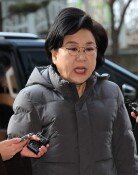Rapid Stock Market Expansion Could Backfire
Rapid Stock Market Expansion Could Backfire
Posted October. 15, 2007 07:10,
Last week, the KOSPI index rose for four consecutive days, reaching new highs for three days in a row. The main drivers of the stock market include relatively lower stock prices, the interest rate cut in the U.S., the strong performance of overseas stock markets, including that of China, and abundant cash flow due to the influx of fund deposits.
However, some say that such favorable factors could block any further uptrend in the Korean stock market in the future.
No more price competition-
The low prices of Korean stocks have been a major driver behind the strong performance of the stock market. But experts point out that Koreas stock prices, which went up more than 30 percent this year, are no longer low.
The average price-earnings ratio (PER) of KOSPI 200 index stocks reached 16.8 recently. Taking into account performance in the first half of this year, it is as high as or higher than the average PER of advanced country stocks (15.7 times). For the past two years, Koreas PER has been about 11.
The lower a PER is, the more undervalued stocks are. There have been mixed opinions as to whether Koreas stock prices were overvalued. But at least consensus has been reached that there is no Korea Discount anymore.
A collapse of the Chinese market could hurt the Korean market-
The countrys stock markets have grown on the robust growth of emerging economies, including China and India, and the strong performance of China-related stocks, including shipbuilding and steel. This means that developments in the Chinese stock markets could have a huge impact on Koreas stock market performance.
The PER of the Chinese stock market averages nearly 30, while Indias averages 24. The CSI 300 Index, which includes major stocks from the Shanghai and Shenzhen stock markets, has a PER of around 40. With rapid stock market expansion, some predict that bubble issues could emerge after the Beijing Olympics in August next year.
If it turns out that stock prices on these markets fall rapidly, the Korean stock market could also collapse.
Kim Hak-kyun, a researcher at Korea Investment, said, In general, it is considered risky if the PER goes higher than 20. But Japan once posted PERs of 50 in the past. So the criteria for determining bubble risk remains unclear. Bubble risk is dangerous because of such unpredictability.
Pressure for inflation and signs of recession-
The interest rate cut in the U.S. last month turned around investor confidence in the global financial market, but it also led to a weakening dollar and commodity price hikes. Many said that China would also contract its economy over concerns about overheating. The possibility of global inflation can always put a drag on the stock market.
Kim Hak-ju, director at the research center of Samsung Securities, explained: Once governments consider the redemption of their currencies, asset prices, including stock prices, will nosedive.
Another variable is signs of economic slowdown. Kim Young-ik, vice president at Hana Daetoo Securities, said, The leading composite index for August was up 7.4 percent year-on-year, while that for September was up only 7.2 percent, predicting that there will be stock price adjustment in late October or early November.
Limitations of the role of liquidity-
Abundant liquidity, including a large pool of fund deposits, has supported Koreas stock market. Conversely, however, that means that diminishing liquidity will put the brakes on the stock market.
The KOSPI index rose 62.82 points from October 8 through 11, when the stock market went up four days in a row. During that period, the prices of 366 stocks grew and those of 497 stocks dropped. The fact that more stocks saw their prices decline demonstrates that capital inflow is concentrated on a few stocks.
Sung Jin-kyung, market strategy team leader of Dashin Securities, said, A stock index goes up despite more stocks declining because the fundamentals of the market have weakened and the market has become vulnerable to external factors.
swon@donga.com sublime@donga.com







